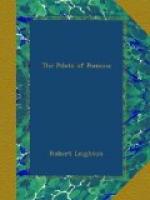“Yes, I can tell you that,” she replied.
And then she turned round, pointing with accusing finger at Tom Kinlay, “’Twas him that did it. I saw it all. See, even the dog kens its own master’s blood!”
At Kinlay’s feet crouched Lothian’s dog, snarling angrily as it looked at a stain on the young man’s trousers.
Consternation filled me as I heard this terrible accusation. Mr. Drever alone of those present seemed unmoved; he alone seemed to have expected it. Tom Kinlay’s face grew pale and haggard, and he almost tottered as he stood there with all eyes directed upon him.
When the excitement had subsided, Mr. Duke looked towards Thora and asked her to tell all she knew, in her own way, and to omit no detail. She accordingly stepped a little nearer to the table, resting her hand upon it, and gave her evidence in a clear, unfaltering voice. Her narrative was to the following effect:
On the day of the commencement of the snowstorm Thora, who had not been to school since her illness, went over to Clouston to visit her young friend Hilda Paterson. When the storm came on she issued out of the cottage and took the road as far as Stenness, and over the undulating land of Sandwick, where the snow wreaths were already so deep that often on her way she failed to recognize the landmarks. She travelled in uncertainty as to the direction she was taking, and felt utterly tired out—for she was not yet strong—when she came unexpectedly to a little cottage, and, to her dismay, found she had walked nearly three miles out of the direct road home.
The cottage was a tiny building of rough stones, and the snow found its way inside through the wide crevices in the walls. It was the home of one Mary Firth, a lone old woman who earned her living by knitting stockings and burning kelp. Opening the door, Thora entered the only room. There was no one within and the fire was dead out, for Mary Firth had gone away that morning to Kirkwall to sell her stock of knitting. Thora was cold and hungry; she considered it impossible to reach Crua Breck before dark, and the snow was falling heavily, so she determined to wait till old Mary returned. She got a few pieces of dry peat from a corner and piled them on the hearth, then sought for Mary’s flint and steel, and proceeded to kindle a fire. Its warmth was comforting, and she sat there on a low stool until the peats glowed hot and the kettle began to boil.
Still Mary did not return. There was no tea to be found in the cupboard and the only particle of food was a piece of oaten bannock. There were a few raw potatoes, however, and Thora put some of these in the fire to roast.
She was looking out at the falling snow through the little window, and expecting Mary, when in the distance she saw the figure of a man walking in the direction of Lyndardy farm, and bending forward as he fought against wind and snow. Behind him was a dog, and she knew at once that the man was Colin Lothian.




